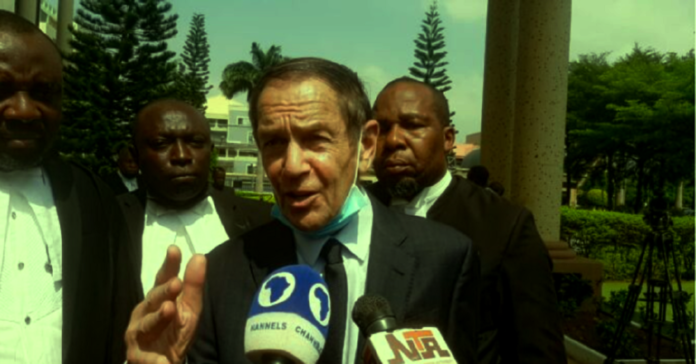By Izunna Okafor, Awka
Bruce Fein, a US-based international lawyer and spokesman for the Leader of Indigenous People of Biafra (IPoB) Mazi Nnamdi Kanu, has replied the British High Commissioner to Nigeria, Honorable Catriona Laing over her recent tweet concerning the Biafra self-determination.
Recall that the British High Commissioner had, on 12th May, ‘joyfully’ tweeted about her recent meeting with the President-General of Ọhaneze Ndigbo, Chief George Obiozor and other stakeholders from the South East geopolitical zone, in which she also said the Igbo leaders were committed to a united Nigeria and would continue to promote it.
Laing’s tweet partly reads: “Good to meet Ambassador George Obiozor, President-General of the Ohanaeze Ndigbo and other senior leaders from the South East. I heard clearly their commitment to a united Nigeria and their proposals on how to achieve this. Looking forward to more engagements in the near future.”
However, in a letter from Kanu’s international lawyer, Fein, and addressed to the British High Commissioner, he described the May 12 tweet as astonishing and appalling, and wondered the essence of the meeting and why the British envoy would sound such delighted thereafter.
Dated June 1, and titled “Re: Biafra Self-determination”, Fein’s letter, which was made available to newsmen by Kanu’s special counsel, Barr. Aloy Ejimakor, reads:“Dear High Commissioner Laing, I was astonished, if not appalled, by your May 12 tweet.
“You voiced delight at meeting
with Ambassador President General George Obiozor of the Ohanaeze Ndigbo and other senior
leaders from the South East. Why the delight or the meeting? Ambassador Obiozor is to Biafrans during their ongoing genocide by the Fulani what Lord Haw-Haw was to the British during the Nazi Blitz? Why would you meet with a quisling?
“Even more reprehensible was your tacit enthusiasm for a united Nigeria, indistinguishable from a suicide pact for Biafrans. As you know, Nigeria was artificially created by the United Kingdom (UK) at the point of machine guns in 1914. Following its signature
divide-and-conquer colonization policy, the UK forced the Biafran people, with a right to self-determination, against their will into a combustible mixture of incompatible ethnic groups under
the umbrella of UK sovereignty. The UK decamped in 1960 leaving Nigeria poised to explode like nitroglycerin. The 1967-1970 genocide of Biafrans, aided and abetted by the UK itself, was as predictable as Newton’s laws of motion.
“Prior to compelled unification in 1914, the British negotiated treaties with Biafra. A jus cogens norm of international law endows the Biafran people with a right to self-determination against a Fulani-controlled Nigerian government that has notoriously excluded all Biafrans but a handful of bribable defectors from the corridors of power. One stark fact speaks volumes. No Fulani has ever been prosecuted and punished for murdering a Biafran in the history of Nigeria!
“Self-determination stands at the apex of all internationally recognized human rights because it is preservative of all others. Self-determination is a shield against oppression by the tyranny of the majority or the ruthless. The UK insisted on self-determination for Protestant Northern Ireland to forestall probable persecution by the Roman Catholic Republic of Ireland. It supported a 2011 South Sudan self-determination referendum to redress the persecution of the largely Black, Christian-Animist minority in Sudan by the Arab-Muslim governing majority.
“Instead of supporting a united, lawless Nigeria, confected by the British for ulterior motives, you should be advocating a United Kingdom suit against Nigeria in the International Court of Justice for denying the people of Biafra a self-determination referendum as required by Article I of the International Covenant on Civil and Political Rights and an infinite number of corresponding human rights treaties and resolutions. It is the least that the UK can do to atone for its egregious crimes and sins against the Biafran people that have persisted for more than a century.
“There is no statute of limitations on justice.
“I expect a substantive response at your earliest convenience.
“Self-determination is too important to be left to temporizing or tergiversation.”







